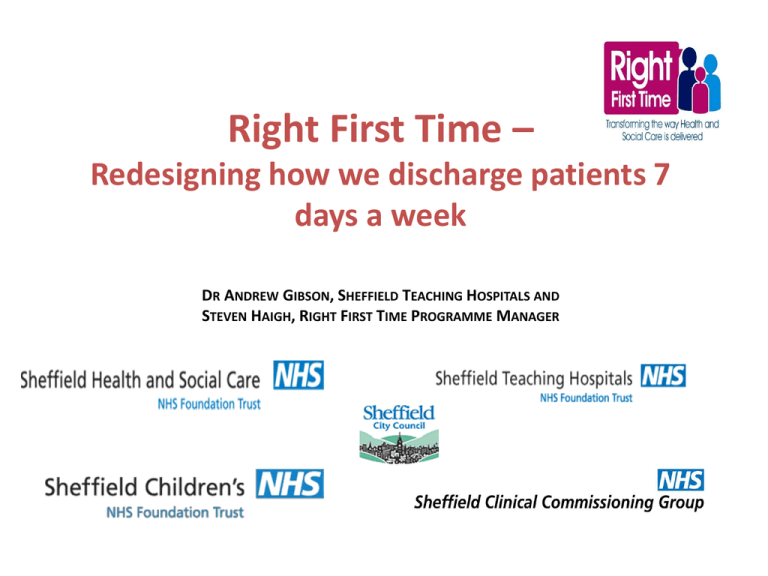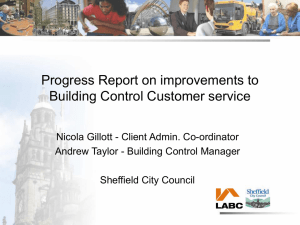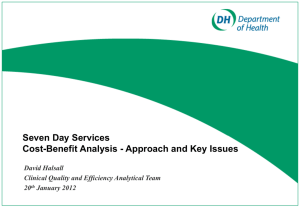
Right First Time –
Redesigning how we discharge patients 7
days a week
DR ANDREW GIBSON, SHEFFIELD TEACHING HOSPITALS AND
STEVEN HAIGH, RIGHT FIRST TIME PROGRAMME MANAGER
The Sheffield Vision for a 7 Day Service
Any Sheffield citizen’s experience of the health
and social care system is a positive one, where
their care needs are met at the right point and
delay in accessing care is eliminated.
By eliminating delay we will improve the
outcome for the individual and make better use
of the resources available.
This is a whole system challenge
Sheffield in the National Context
Common challenges with:
• Length of Stay
• Increasing rates of emergency admissions
• Delayed discharges
• High variation between weekday and weekend discharges
• Challenges with the costs of long term care
THE VARIATION BETWEEN WEEKDAY AND WEEKEND CAPACITY
HAS A SIGNIFICANT IMPACT ON EFFICIENCY AND EFFECTIVENESS
The Sheffield Approach
• Ambitious Better Care Fund Plan (£280m)
• Strong on partnership and relatively stable
• Recognition that delays cause harm and that until we get the
system flowing we don’t know how big a hospital or
community we need
IF WE REDUCE AVOIDABLE ADMISSIONS AND MINIMISE DELAYS
WITH DISCHARGE THE POTENTIAL RESOURCE SHIFT TO THE
COMMUNITY COULD BE EQUIVALENT TO A SIGNIFICANT
NUMBER OF BEDS
The Sheffield 7 Day Challenge – the
immediate focus
ACUTE CLINICAL STANDARDS – baseline assessment
showed:
1. Key gaps in workforce • Junior doctors, nurse practitioners and AHPs
• Consultant numbers to assess care needs in 1
hour for the sickest patients
2. Key service issues –
• Specialties are all at different levels of readiness
The Sheffield 7 Day Challenge – the
immediate focus
COMMUNITY STANDARDS – or looking at the
system as a whole
We see whole system flow (Right Care, at the
Right Time, with the Right Person) as being
important to quality and safety
LEVELLING UP WEEKEND TO WEEKDAY
DISCHARGE RATES IS IMPORTANT AS A
MEASURE OF FLOW
The Sheffield Challenge – the
immediate focus
What have we done?
• Switching from assess to discharge to
discharge to assess
• Built capacity in the community (Active
Recovery) to take discharges in 24 hours, 7/7
• Developed the for IC bed model to take
transfers in 24 hours, 7/7
• Need to address long term care in the same
way
Early D2A Testing Showed
Where are we now?
• D2A now established on GSM wards and will
rollout to other medical specialties
• Active Recovery is down to a 24 hour wait
(from a mean of 7 days)
• Discharging to off site beds at weekends is
better
• DTOCs currently down to around 40 (not good
but better then 125+ earlier this year)
What’s next for 7 day discharging?
COMMUNITY STANDARDS:
• Stabilise D2A – making it business as usual
• EVALUATION – is it better for patients, is it
affordable
• Link to the Commissioners plans for the Better
Care Fund
What’s next for 7 day discharging?
ACUTE STANDARDS
• Focus on the 91% that just go home – 1.58:1,
weekday to weekends
• Identify the key service transformations
needed to enable this – ward processes, 7 day
senior decision makers (doctors, nurses,
therapists etc), transport, TTOs
• Move to morning discharging 7 days per week











